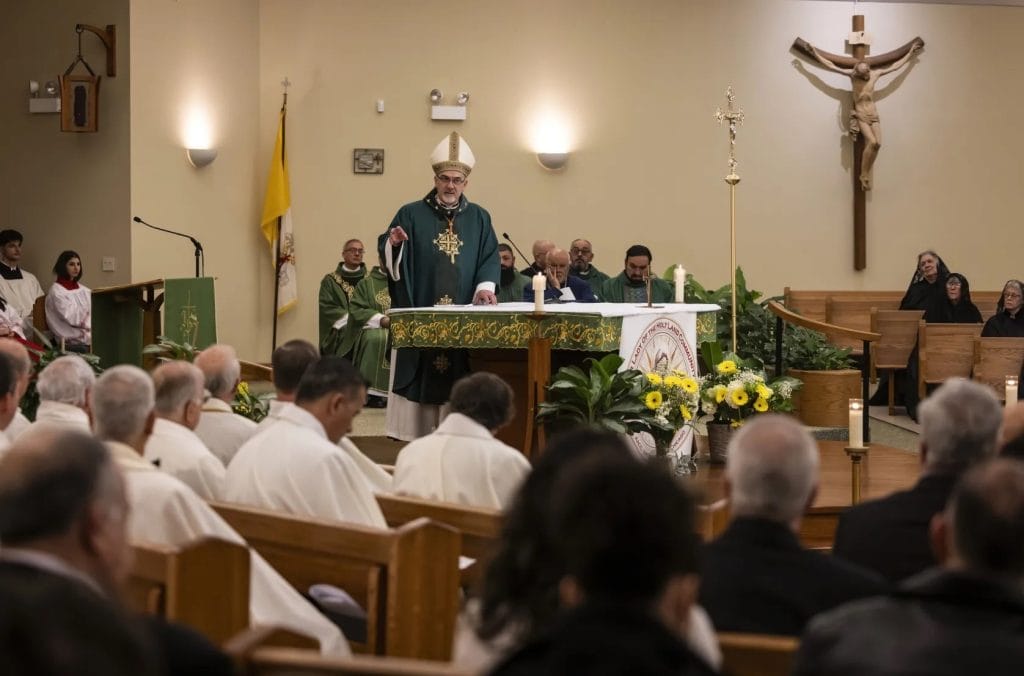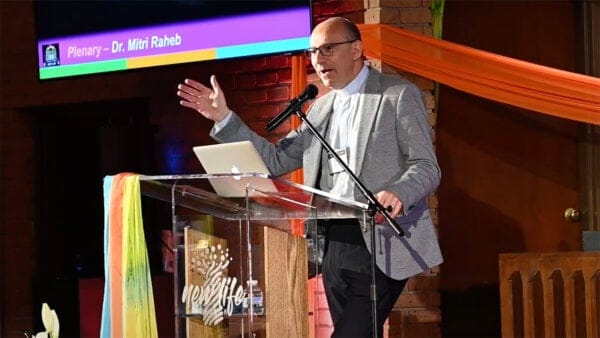
Previous In Chicago, Cardinal Pizzaballa calls for a ceasefire in Palestine

By Daoud Kuttab
(RNS) — When the New Life Presbyterian Church in Atlanta invited the Rev. Mitri Raheb to speak at their Matthew 25 summit, he wanted his trip to the United States to be more than a single sermon at a church event. Palestinians were suffering from the carnage in Gaza, and he knew he had a bigger mission.
“I asked for and was able to organize visits to Washington where I met people at the White House National Security Council, as well as members of Congress,” he told Religion News Service in late January, after returning to Bethlehem from the U.S.
In his meetings with political officials, religious leaders, and anyone interested in talking to him, Raheb said he focused on two issues.
“Number one issue was the urgent need for a cease-fire in Gaza to stop the bloodshed, and number two, I wanted to remind our American friends that there are Palestinian Christians,” he said.
Raheb, who pastored the Bethlehem Christmas Evangelical Church between 1987 and 2017, wanted to bring home to Americans that the Israeli bombings in Gaza are decimating the already tiny Palestinian Christian community, with only about 1,000 mostly Greek Orthodox left in the enclave.
“Those who survived are taking refuge in local churches, while unable to move around for fear of snipers taking their lives — as happened to two women who left the church compound to get to the restroom,” Raheb said.
Born in the Palestinian town of Bethlehem in 1962, Raheb is the founder and president of Dar al-Kalima University in his hometown. He has written or co-written dozens of theological and political books on the situation of Palestinians in general and the theology of Palestinian Christians in particular.
His latest book, which he will be talking about in lectures at Harvard Divinity School next April, is entitled “Decolonizing Palestine: The Land, The People, The Bible.” The book, published on Aug. 30, 2023, challenges the weaponization of biblical texts to support the current settler-colonial state of Israel. Little did Raheb know that, a few months after his publication, the Israeli Prime Minister would turn to the story of Amalek to justify the killing of innocent Palestinians. His use of this passage in the Bible was part of the genocide case brought by South Africa to the International Court of Justice, which ultimately ordered Israel to take a series of measures to protect civilians in Gaza.
In Washington, the Palestinian Christian theologian asked his organizers if they could arrange for him to meet conservative Republicans. “I didn’t want to be preaching to the converted,” he told RNS. “I wanted to debunk the mistaken Christian Zionist narrative that they had and to introduce the authentic Palestinian narrative and especially the Christian Palestinian perspective.”
In addition to meeting key members of the Biden administration’s National Security Office, Raheb also met with a number of members of Congress, as well as some of their aides.
“I met with an aide to Florida’s Republican Senator Marco Rubio, who sits on the important Foreign Relations Committee, and had lunch with Republican Michigan Representative John Moolenaar. Raheb said he had no illusion that his meeting with officials and elected representatives would change anything overnight.
“I know where most elected officials get their support, but I wanted to bring home the importance of a cease-fire and the urgent need to provide humanitarian aid,” he said.
Raheb said he wanted to make clear in his meetings how he believes that language used by the Israelis invites genocide: “I reiterated to those I met the dehumanizing language that Israeli officials have been using against Palestinians, including the weaponization of the Bible to justify brutality against Palestinian civilians, cultural and educational institutions, as well as houses of worship.”
As president of a Palestinian higher education institution, Raheb also used his visit to the U.S. to meet with partner educational institutions and widen the university’s network of friends.
“Dar al-Kalima University is the only school of its kind in Palestine, as we focus primarily on arts, culture, and design. We also give high focus on instilling entrepreneurship skills,” said Raheb, who speaks proudly of the success of some of the startups that graduates of Dar al-Kalima have established.
“Our students’ films have won prizes regionally and internationally and sold films to Netflix; and one of our startups, PAL-Favors, uses Palestinian motifs in training suits and wedding gifts and has become a successful enterprise,” he said.
Raheb, who was awarded the Bethlehem Star by President Mahmoud Abbas, proudly shows his picture with the Palestinian leader on the homepage of his website. He was elected in 2018 to the Palestinian National Council and to the Palestinian Central Council, is a founding and board member of the National Library of Palestine and an adviser to the Higher Presidential Committee on Church Affairs.
Dar al-Kalima University, which Raheb established in 2006, has also contributed to the research on the Christian presence in Palestine. “We mapped the entire Palestinian Christian organization in Palestine and discovered that one-third of all Palestinian medical and educational institutions were started and are run by Palestinian Christians. Our charities and NGOs are the third-highest employer in Palestine, and we are pumping in $400 million a year in various institutions throughout the West Bank and Gaza,” he said.
Raheb’s lecture at the Presbyterian summit brought more than 350 in person and hundreds more online. Raheb offered a Palestinian Christian perspective on Matthew 25, saying that churches with a social justice ethos — who are eager to apply Jesus’ command to feed the hungry, clothe the naked and visit the prisoner — will grow. “Our message from Palestine fits very well with the goals of the Matthew 25 churches,” he said.
The Palestinian Lutheran theologian was also invited to speak at a Lutheran church in Georgia, where he focused on the three evils the Rev. Martin Luther King Jr. preached on: Poverty, racism and militarism.
He also met with a number of Black clergy. Raheb was encouraged by the turnout at the meetings in Atlanta and Charlottesville, applauding people’s desire to learn more about the Palestinian experience. For Raheb, these trips and lectures are an important part of his mission to ensure Palestinian Christians, the indigenous people of the land where Jesus was born, can continue to be a witness.
He hopes to see more pilgrims come to the Holy Land who want to engage with the people who live there — what he described as “the living stones” — not just the archaeological Christian locations or the stone churches and shrines.
Link to the article.


تكافح مجلة “ملح الأرض” من أجل الاستمرار في نشر تقارير تعرض أحوال المسيحيين العرب في الأردن وفلسطين ومناطق الجليل، ونحرص على تقديم مواضيع تزوّد قراءنا بمعلومات مفيدة لهم ، بالاعتماد على مصادر موثوقة، كما تركّز معظم اهتمامها على البحث عن التحديات التي تواجه المكون المسيحي في بلادنا، لنبقى كما نحن دائماً صوت مسيحي وطني حر يحترم رجال الدين وكنائسنا ولكن يرفض احتكار الحقيقة ويبحث عنها تماشيًا مع قول السيد المسيح و تعرفون الحق والحق يحرركم
من مبادئنا حرية التعبير للعلمانيين بصورة تكميلية لرأي الإكليروس الذي نحترمه. كما نؤيد بدون خجل الدعوة الكتابية للمساواة في أمور هامة مثل الإرث للمسيحيين وأهمية التوعية وتقديم النصح للمقبلين على الزواج وندعم العمل الاجتماعي ونشطاء المجتمع المدني المسيحيين و نحاول أن نسلط الضوء على قصص النجاح غير ناسيين من هم بحاجة للمساعدة الإنسانية والصحية والنفسية وغيرها.
والسبيل الوحيد للخروج من هذا الوضع هو بالتواصل والنقاش الحر، حول هويّاتنا وحول التغييرات التي نريدها في مجتمعاتنا، من أجل أن نفهم بشكل أفضل القوى التي تؤثّر في مجتمعاتنا،.
تستمر ملح الأرض في تشكيل مساحة افتراضية تُطرح فيها الأفكار بحرّية لتشكل ملاذاً مؤقتاً لنا بينما تبقى المساحات الحقيقية في ساحاتنا وشوارعنا بعيدة المنال.
كل مساهماتكم تُدفع لكتّابنا، وهم شباب وشابات يتحدّون المخاطر ليرووا قصصنا.